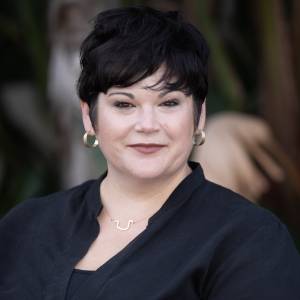
Teaching For Transformation Strand
Cultural Proficiency Minor
Are you planning on becoming a teacher? The Teaching For Transformation Strand is designed with courses that are prerequisites for the California teaching credential program. This strand is part of the Cultural Proficiency Minor, which offers SDSU undergraduate students the opportunity to personalize their learning experience around cultural proficiency practices. It focuses on developing the skills and knowledge needed for teaching in diverse, multicultural environments, making it an essential pathway for future educators.

Key Benefits
- Meet Credential Program Prerequisites: Earn a minor while completing the essential courses needed to apply for the teaching credential program of your choice.
- Cultural Awareness and Competency: The strand integrates credentialing prerequisite courses with 2-3 additional courses focused on cultural awareness. This prepares you to effectively engage with and teach in diverse, multicultural communities.
- Pathway to Various Teaching Credentials: Tailored for students aiming to pursue teaching credentials in various disciplines offered by the SDSU College of Education, including Elementary, Secondary, Special Education, and Dual Language programs.
Who It’s For
The Teaching For Transformation Strand is ideal for:

High School Students & Adults Without a Bachelor's Degree
Those exploring different bachelor's degree options and planning a teaching career.

All SDSU Students
Students in any major who are ready to transition into teaching and would like to earn a minor for completing credential program prerequisite courses.

All Transfer Students
Community college students looking to transfer and complete their intended bachelor's degree program can add the Cultural Proficiency Minor that fulfills credential prerequisites.
Courses
Cultural self-awareness, ethnocentrism, individual biases, institutional oppression, microaggressions, race relations. Historical background of racism. Impacts on current majority-minority relationships.
Application for a democratic and pluralistic society to include critical thinking, multicultural awareness, and social issues. Beliefs and attitudes on cultural issues and identity.
For Example: TE 362 - Fieldwork in Community Settings
Tutoring process and teaching strategies for the content being tutored. Consult a Cultural Proficency advisor for courses you may have taken that meet this requirement.
- ED 451 - Introduction to Multicultural Education (3 Units): Overview of cultural pluralism in education, industry, business, other institutions, and society at large.
- SPED 450 - Classroom Adaptations for Special Populations (3 Units): Historical, legal, and philosophical aspects of special education. Instructional and assessment support for access to general education curriculum. Meets requirements for preliminary multiple, single subject, and education specialist teaching credentials.
- TE 280 - Health Education for Teachers (1 Unit): Topics designated in health framework for California; infusing health topics in the K-12 general curriculum. For multiple or single subject candidates.
- DLE 515 - Multilingual Education: Theory and Practice for Biliteracy Teachers (3 Units): Pedagogical and programmatic practices for addressing linguistic and academic needs of multilingual learners. Historical and theoretical foundations of bilingual education as related to bilingual and dual language programs to include instruction, curriculum, and assessment. Taught in Spanish and English.
- ED 451 - Introduction to Multicultural Education (3 Units): Overview of cultural pluralism in education, industry, business, other institutions, and society at large.
- Math 210 - Number Systems in Elementary Mathematics (Multiple Subject Only, 3 Units): Number sense, operation concepts, estimation, mental arithmetic, algorithms, problem solving, whole, rational, real numbers, ratio, and number theory. This course or its equivalent is required for students working toward a multiple subject credential in elementary education.
- SPED 450 - Classroom Adaptations for Special Populations (3 Units): Historical, legal, and philosophical aspects of special education. Instructional and assessment support for access to general education curriculum. Meets requirements for preliminary multiple, single subject, and education specialist teaching credentials.
- TE 280 - Health Education for Teachers (1 Unit): Topics designated in health framework for California; infusing health topics in the K-12 general curriculum. For multiple or single subject candidates.
- DLE 416 - Biliteracy Foundations for Teaching and Learning in Diverse Communities (3 Units)
*Not a requirement for bilingual partners: Oral, written, and communicative competencies in Spanish through practical experiences and study of sociopolitical and sociocultural contexts impacting bilingual learners in culturally and linguistically diverse communities.
- SPED 450 - Classroom Adaptations for Special Populations (3 Units): Note: if you have previously taken SPED 500, that will be accepted in lieu of SPED 450. Historical, legal, and philosophical aspects of special education. Instructional and assessment support for access to general education curriculum. Meets requirements for preliminary multiple, single subject, and education specialist teaching credentials.
- SPED 501 - Typical and Atypical Learning Processes (3 Units): Theory, research, and processes in learning in relation to individuals with disabilities. Foundations of learning, development, and intervention.
- SPED 502 - Field Experiences in General and Special Education (1 Unit): Observation and participation in general and special education classrooms and related school activities for students with disabilities.
- SPED 527 - Special Education in a Pluralistic Society (3 Units): Historical and philosophical perspectives of cultural pluralism in special education and programs related to diverse students with disabilities. Research on curricular approaches and instructional needs. Sociocultural aspects related to disability, race, ethnicity, gender, and language.
- DLE 915A - Teaching and Learning in the Content Area, Designated and Integrated English Language Development-Multiple Subject (3 Units): DLE 915A is a prerequisite for the SPED credential; however, as a graduate-level course, it is not eligible as a minor elective.
Contact Us



